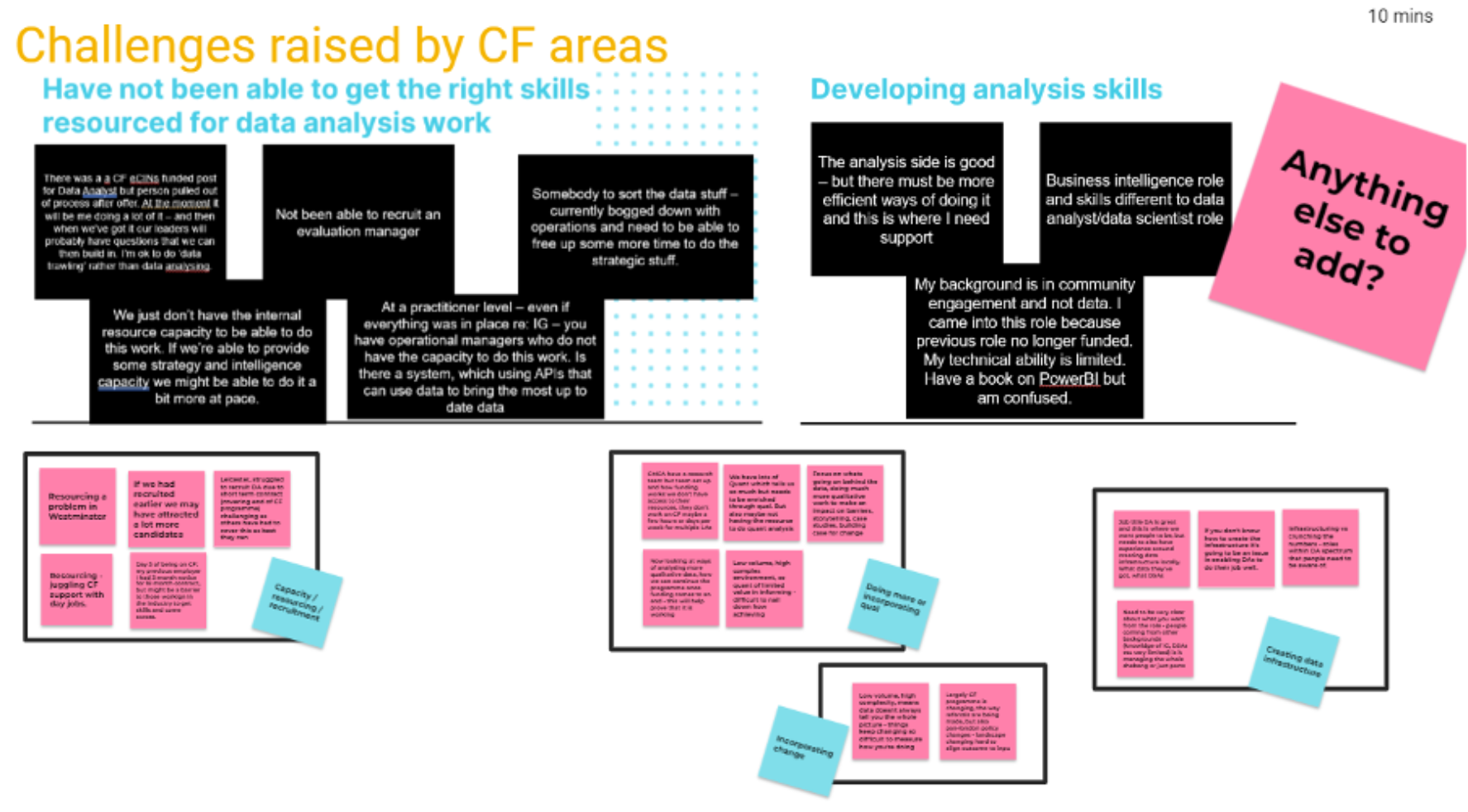
Understanding systemic constraints using communities of practice

As part of our support for Changing Futures – a £64m, three-year programme to establish new ways of helping people facing multiple disadvantages, such as mental ill health, domestic abuse, or substance misuse – Social Finance has been working with the 15 programme areas on their use of data. Across four blog posts we will outline various strands of this work, from what we’ve learned about the needs and experiences of data analysts, through to the use of data sharing agreements, how we’ve supported one area to link their operational and outcomes data, and how we’ve brought an awareness of qualitative research into the toolbox of data analysts.
We hope to show the multifaceted work involved with bringing about services that can understand and make better use of data. This is not simply about analytics and dashboards, but about the ability to understand and ask ‘what is useful?’ and get buy-in to the collation and effective use of data that puts people experiencing multiple disadvantages at its heart.
In the first of these posts, we will look at how we’ve worked with the Changing Futures data analyst community of practice, and how that helped us to understand the particular needs and experiences of those working in this space.
Other posts in this series:
About the data community of practice
The community of practice (CoP) was originally conceived as a place where data leads and those working with data for multiple disadvantages could come together to talk about the progress of their programmes for one hour every 4–6 weeks. This provided a dedicated space to troubleshoot any issues and make connections of peers for support and shared learning.
We noticed that while this offered a useful space for people to come together, attendees at the community of practice were often joining from very different experiences or were at different points in their journey of setting up their programme. This meant that conversations often weren’t relevant to everyone, and the learnings shared weren’t as timely as they could be, making them less useful or replicable.
This, in turn, meant that the CoP had a small, but limited, impact in building relationships and developing a community of learning.
Communities of practice are groups of people who share a concern or a passion for something they do and learn how to do it better as they interact regularly.
Etienne and Beverly Wenger-Trayner, Introduction to Communities of Practice
So, in October 2022 we decided to make a change to the membership of the sessions, targeting this more towards data analysts working with data for multiple disadvantages in their day-to-day work (we asked other previous participants to join another of the communities that we run).
We also endeavoured to learn more about our members; their experiences and interests, so that we could develop themes for knowledge sharing and spark conversations that would be useful and timely.
As part of this, we invited participants to join us in discussion about some of the challenges faced by data analysts working within the Changing Futures programme, from recruitment and skills to community and organisational structure, so that we could better support those undertaking this work.
From previous research, we understood some key challenges faced by data analysts, though these insights were a little too high level for us to be able to translate them into useful changes in the community. These were:
- Areas had faced delays with data analyst or data lead recruitments, partially caused by the use of fixed-term contracts.
- Getting information governance and data sharing agreements in place took time and sometimes delayed getting analysts involved.
- People came into the data role with differing levels of data experience.
So in order to understand more about this, we took some time from a regular community of practice meetup to facilitate a discussion using Jamboard.

We asked participants to think about:
- What data challenges they have faced in delivery of the programme.
- Their professional background before coming into the role.
- How they would describe their role on the Changing Futures programme.
- Where their role sits in their wider organisational structure.
- What training they have had in the past year.
- What support they felt they need to do their job well.
- What support they have in their team, area or local authority.
After the meetup we went through participants responses and undertook synthesis to draw out key themes. We found:
Squiggly career paths and organisational inconsistency
Data analysts described their different roles and experience before coming into their current role. Most had relevant programme experience, for example as front-line support workers in homelessness or related services, and some had project delivery, data co-ordination or data entry backgrounds.
We found no consistency of where Data Analysts working on the programme find themselves within their organisational structure. Participants told us about that they have limited access to other analysts for peer support. Where participants did have team support, it generally didn’t extend to data.
Most also told us that they had not received data related training in the past year, and, while some told us that they had been part of excellent NHS training, one participant mentioned that they had undertaken training “online on a Saturday morning” furthering variance amongst the cohort.
Versatility and focus on data work
Across a number of questions our participants told us that capacity was their biggest concern, that there were often not enough people to undertake all the different types of work or nobody to delegate to.
They also described needing to undertake not just data or analysis work, but also admin, strategy, reporting or representation at boards, project management, co-ordination or even evaluation.
This led many participants to refer to themselves a ‘jack of all trades’ or a ‘master of multitasking’.
There may be numerous reasons for this, for example the differing experience across participants, the variance of where Data Analysts sit within organisational structure, or the nature of services offered. One participant told us that ‘there are a lot of other initiatives going on that are being prioritised’; these are all likely to increase participants needs to undertake a variety of tasks outside of analysis
Activities and expectations
Following the above, our participants told us that they had ended up doing much more ‘data infrastructuring’ work, that is, supporting the development of data sharing agreements or co-ordination of information governance. Mostly this has been reflective of the work required to get good quality data sharing in place, but participants also told us that they saw these roles as being inherently different.
Some told us that it would be useful to differentiate between these roles so that there were different people working on infrastructure activities to those working on analysis, or to make clear the different tasks and activities needed at different points in delivery to make job specifications clearer.
Conclusion
Participants at the communities of practice have told us that they find this a useful space to come together to share experience and learn good practice.
The changes we made to the membership of the CoP and a focus on targeting themes to this smaller group have been so important in generating discussion, driving participants opportunities to build connections and relationships.
Given the variety of experiences, career paths and lack of peer support data analysts face, the CoP provides an important opportunity for learning and support that is missing in their day-to-day work.
We hope that members of this CoP will continue to expand this space and drive further collaboration by running and leading their own meetups, co-developing agendas and collaborating on useful resources for the wider community together. There is a significant need to support analysts working in this space to enable them to feel connected and able to learn from others, breaking down barriers between and within organisations so that data analysts no longer feel isolated or unable to seek support for their work.
Get in touch
If you’re interested in finding out more about the data and digital work on Changing Futures, we would love to hear from you.
Contact us
